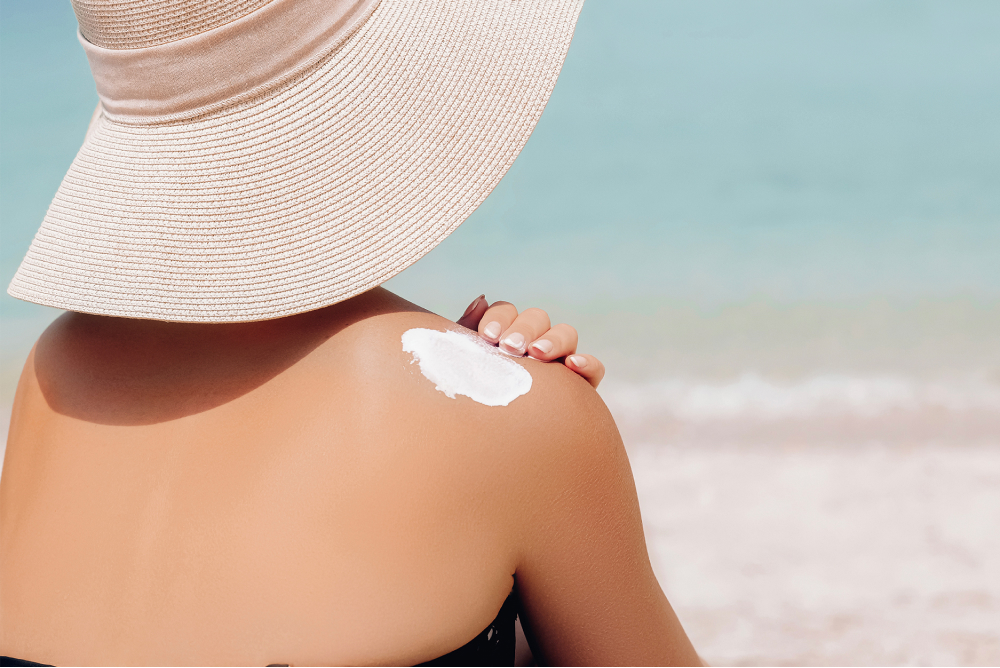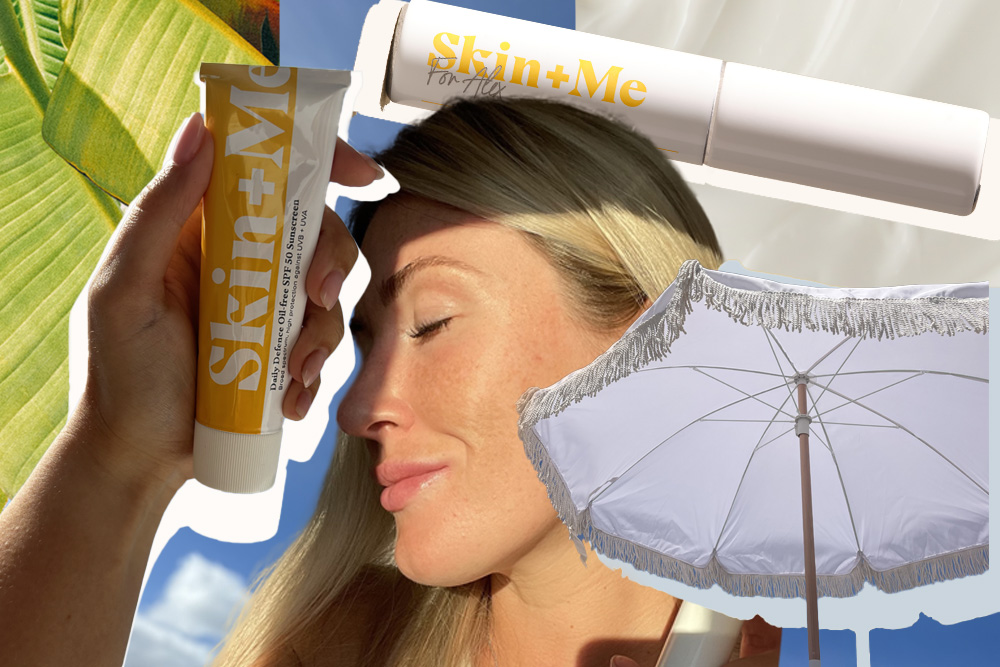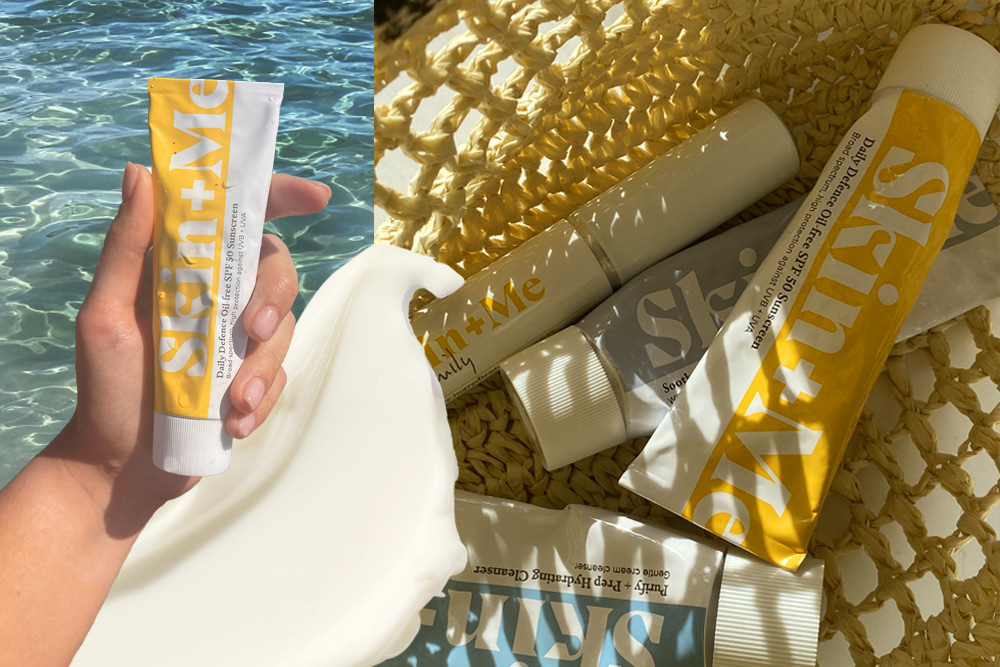Melasma 101

Link to share article here:
Ask A Dermatologist: What’s better, Chemical or Mineral Sunscreen?
All sunscreens are equal, but some are more equal than others. Or, so your skincare counter may claim.
Where to start? In a sea of sunscreen options, whether you plump for chemical or mineral-based protection is up to you. But rest assured, we’re here to help you make the most informed choice for your skin’s unique needs.
Let’s kick off with a few truths. First up, as mentioned in our Skincare and The Sun Guide, daily sun protection is a dermatologist’s non-negotiable. And that means slathering on sunscreen every day – even if you’re mostly staying inside. Harmful UVA rays can penetrate glass, so it’s essential that you protect yourself against them.
Although any sunscreen is better than none, our Dermatology Team recommends that you use at least SPF 30+. Our new Skin + Me Daily Defence Oil-free Sunscreen is SPF 50 – find our more about our everyday hero here.
Remember, that no sunscreen is 100% effective and the best prevention against UV damage, sunburn and photo-ageing is staying out of the sun as much as possible (but shout out vitamin D, we still love you).
We checked in with our Head of Medical, Dr Jason Thomson to ask him about the difference between chemical and mineral sunscreens, and how you can pick the right one for you.
Skin + Me: What are the differences between chemical and mineral sunscreen?
Dr Jason Thomson: The main difference between mineral and chemical sunscreen is the way they work. Chemical sunscreens (e.g avobenzone, octocrylene) use specific chemicals to absorb the sun’s harmful ultraviolet rays. Mineral sunscreens use molecules that physically block and reflect the rays (eg. titanium dioxide and zinc oxide) – which is why mineral sunscreen is sometimes called ‘physical sunscreen’ or ‘sunblock’.
Chemical and mineral refers to the type of UV filters contained in a sunscreen which work in different ways to protect our skin. Broadly, chemical sunscreen filters absorb UV light and convert it into heat and include ingredients such as octinoxate and avobenzone. Mineral sunscreen filters are compounds such as zinc oxide and titanium dioxide that reflect and scatter UV light – although recent studies have shown that they do absorb UV light, particularly when micronised (made into smaller molecules).
Skin + Me: Can I tell the difference between chemical and mineral sunscreens from how they look and feel on my skin?
Chemical sunscreens are generally more cosmetically acceptable. The formulations containing them are usually more cosmetically elegant with a lighter texture and are less likely to leave you with the dreaded white cast.
Mineral sunscreens are often thicker and more prone to leaving a distinctive white cast. This is because of the large size of the mineral filter compounds which sit on the skin and aren’t absorbed. Look out for newer mineral sunscreen formulations that use nanoparticles and micronised forms of the filters that are much smaller, making them more cosmetically acceptable.
Mineral sunscreens are more stable than chemical sunscreens which means fewer preservatives are generally needed. This makes them a good option for those with sensitive and easily irritated skin.
Skin + Me: What are the pros and cons of chemical and mineral sunscreen?
Dr Jason Thomson: The first point is that both mineral and chemical sunscreens work at their primary goal in protecting the skin against short and potentially long-term damage.
“The first point is that both mineral and chemical sunscreens work at their primary goal in protecting the skin against short and potentially long-term damage.”
Mineral sunscreens have the advantage of being quick to use because they don’t need to be absorbed and can give protection almost immediately. They tend to be less irritating to the skin and this is useful for people with particularly sensitive skin.
On the downside though, mineral sunscreens create a physical block which tends to be less aesthetically pleasing and can be harder to rub in.
Chemical sunscreens have the regular advantage of being easier to apply and usually leave less of a residue.
Chemical sunscreens are absorbed into the skin and have been found to circulate in the bloodstream. The effects of this are not fully understood but we often advise pregnant women and children to avoid chemical sunscreens. There have also been reports of concerns about some chemical sunscreens being harmful to some marine and coral life.
Skin + Me: What’s the best way to choose sunscreen to suit your skin type?
Dr Jason Thomson: The most important factor is to find an SPF that protects your skin. It’s more than a simple choice between chemical and mineral. There are a number of factors in terms of skin type to consider. Firstly, if your skin is acne-prone then choosing an SPF that does not block your pores (anti-comedogenic) is important. These tend to be lighter gel and lotion formulations.
If your skin is particularly sensitive then a mineral sunscreen may be a better choice over a chemical sunscreen. For darker skin types, the mineral sunscreens can often leave a residue and are cosmetically less acceptable.
Skin + Me: Do chemical sunscreens get a bad reputation?
Dr Jason Thomson: Ultimately chemical sunscreens provide excellent protection against the short and long-term dangers of sun exposure. There’s not enough clinical evidence behind the harmful effects of chemical sunscreens after absorption into the bloodstream to advise their avoidance, compared to the potential harms of skin cancer.
“Ultimately chemical sunscreens provide excellent protection against the short and long-term dangers of sun exposure.”
Skin + Me: Tell us about modern advancements and innovations in SPF skincare?
Dr Jason Thomson: The main advancement in sunscreens in recent years has been the use of nanotechnologies to make bulkier components of sunscreens (e.g. titanium dioxide and zinc oxide) into much smaller particles. This allows for more cosmetically acceptable creams with physical blocks.
There has also been a greater understanding of the role of high energy blue light, visible light and infrared light, particularly in some pigment disorders such as melasma. In response, newer sunscreens with even wider protection have been developed.
There’s also a new range of chemical filters providing even more protection over larger ranges of the ultraviolet light spectrum. Newer innovations include sunscreens for the scalp as well as the addition of other anti-inflammatory and antioxidants.
Medical facts checked by Head of Medical, Dr Jason Thomson
Ready to add Daily Defence to your next month of Skin + Me? Log in to your account to update your routine.
New to Skin + Me? Get your first month of personalised skincare for £4.99 with promo code DOSE – complete our quick consultation here.
Looking for a routine refresh? Add the Dream Routine to your Skin + Me subscription.
In need of a restock? Head to The Skincare Shop for one-off purchases of your Routine Essentials.



